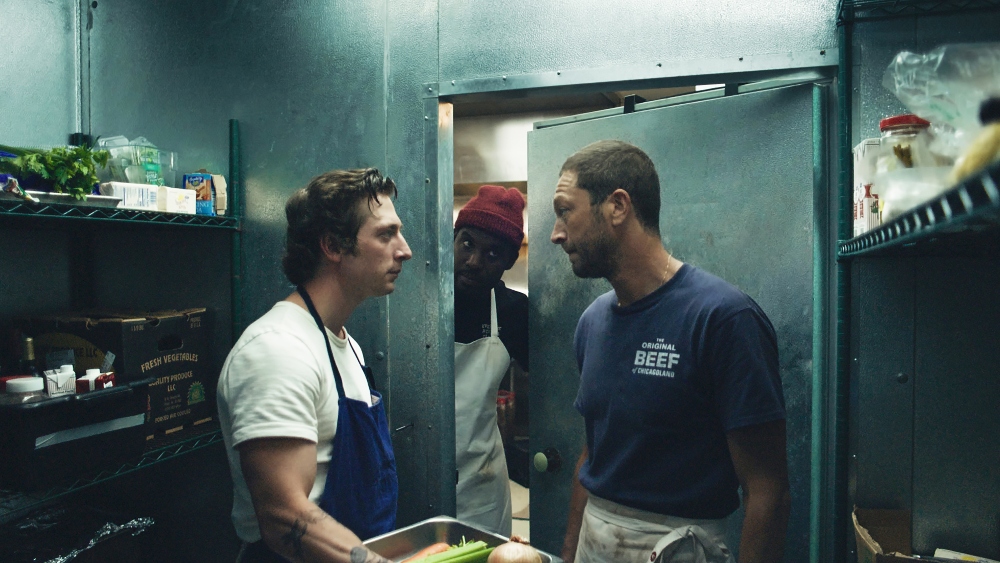
In the world of fine dining, the art of cooking is very specific, from the way you hold your spoon to properly putting on your chef’s apron. Life imitates art — with a few extra ingredients added — in FX’s new series The Bear, which is now streaming on Hulu.
Shameless alum Jeremy Allen White stars as Carmen “Carmy” Berzatto, a star chef in the fine-dining world who abruptly returns home to Chicago after his brother’s death to run his family-owned sandwich shop, the Original Beef of Chicagoland. Carmy brings his fancy cooking skills to an otherwise short-order establishment, motivating the kitchen staff and re-branding the restaurant into an upscale dining experience.
To portray the chef, White went to two weeks of cooking school, where he learned the basics, such as knife skills and plating. However, it was with Dave Beran, owner of Pasjoli, the Michelin star-rated French Bistro located in Santa Monica, California, that he perfected other important culinary attributes. Beran traded in his BA in business to pursue his passion for cooking, and his education served him well, as he shot up the ranks to become an award-winning chef (James Beard Award for Best Chef: Great Lakes, along with Chicago-based Next, which won a James Beard for Best New Restaurant in America under his executive chef leadership). Beran was not there to teach White how to cook, but rather how to be a chef, and learn the fine art of kitchen etiquette as if he’d been doing it for years.
The way Beran was chosen to work with White is a story unto itself. Years ago, The Bear creator Christopher Storer was a patron at his former Santa Monica restaurant, Dialogue — Beran’s first solo endeavor where he created a seasonal tasting menu inspired by California’s abundant local ingredients. Back then, Storer was picking his brain, and in fact, some of Beran’s origin story (i.e. moving from Chicago to Los Angeles to open his own restaurant, Pasjoli) runs parallel to the series.
Below the Line spoke with Dave Beran via Zoom from Pasjoli, where a very busy staff was preparing for dinner service. Beran shared how he and his chefs showed White how a restaurant kitchen runs from soup to nuts. He also offered the actor invaluable culinary advice from his own hellish early experiences on the line. By the end of his two-week internship, Beran said he had no reservations about White joining his line, as he cooked Loup de Mer et Fenouil (pan-roasted sea bass with glazed fennel, celery, and arugula salad, drizzled with a lobster velouté) off of the acclaimed menu.
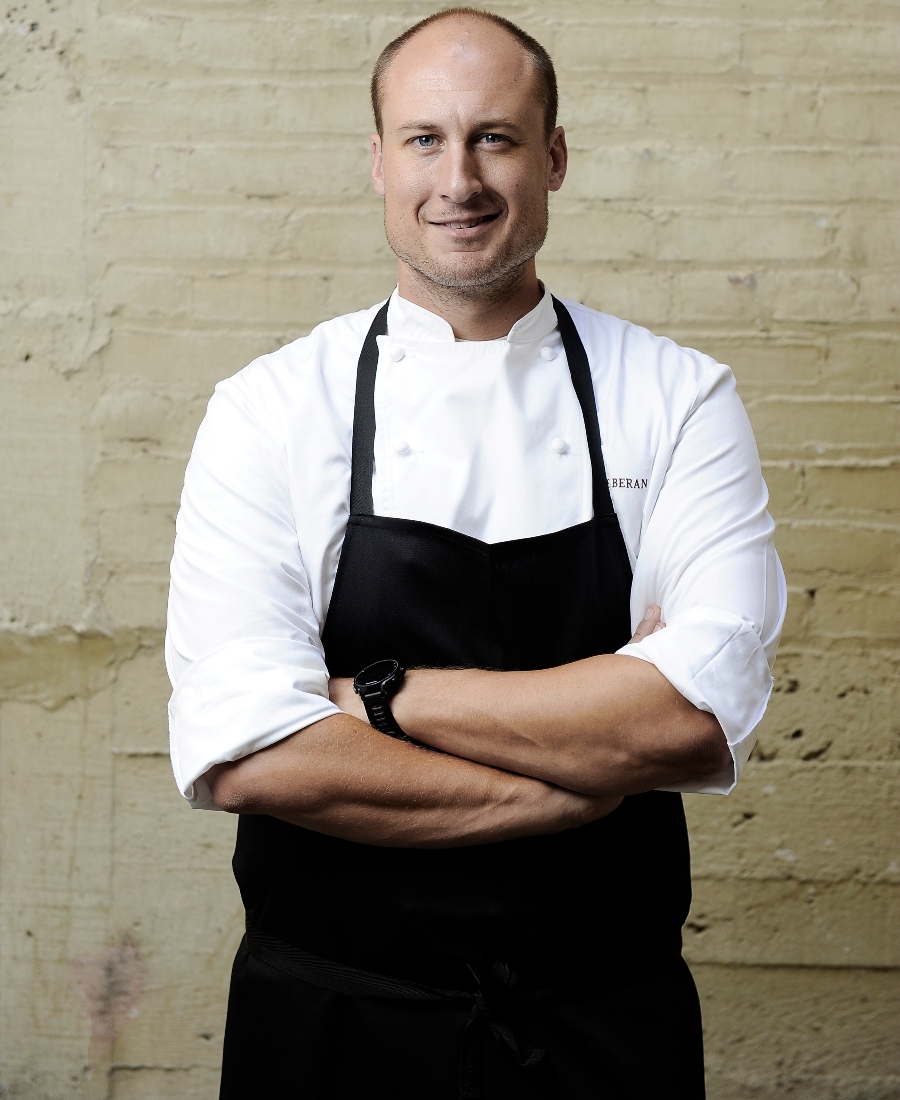
Below the Line: Tell me a little bit about your restaurant. How did you get the name?
Dave Beran: The original name was gonna be “Jolie.” We were opening our first fine-dining restaurant and it didn’t really feel right. About three months before we opened Bistro Jolie opened up in Beverly Hills so we kept calling this “Not Jolie,” and French for that is “Pasjoli.” You kind of sit back and let things name themselves. We started out as a pretty classic French bistro and evolved more into focusing more of what we have in Southern California as far as ingredients and the market which is down the street and doing it through the lens of Parisian cuisine. We are still sticking to a lot of French technique and French philosophy. We first started with Dover Sole and I thought why are we flying in fish from England when we’re sitting on the Pacific Ocean. The restaurant kind of evolved from that point.
BTL: Why were you approached to coach Jeremy Allen White for the series?
Beran: [Creator] Chris Storer came into Dialogue back when we had that, which is more like an 18-20 course tasting menu. I met him there so when they approached us for Jeremy to come spend time in the kitchen, there were a few overlapping things. Obviously, it was that fine-dining background, but also, his character is someone who comes from Chicago and left to go work at a fine-dining restaurant but is going back there. I started cooking in Chicago and the restaurant that they used to film Mr. Beef, my sous chef used to send me there to grab staff meal for us. That was walking distance from my first Chicago restaurant M.K.
I would say if you took the pizza aspect out of the L.A. restaurant Spago and added a steakhouse. I’d been cooking in Chicago from 2003 until I moved to L.A. in 2016, so there was a lot of that understanding of the evolution of the dining scene in Chicago, then going away to chase the fine-dining dream. In his case instead of coming home, I moved to L.A. Even his age bracket of early/mid-30s, if he were cooking in Chicago and working at Alinea he would’ve been one of my cooks.
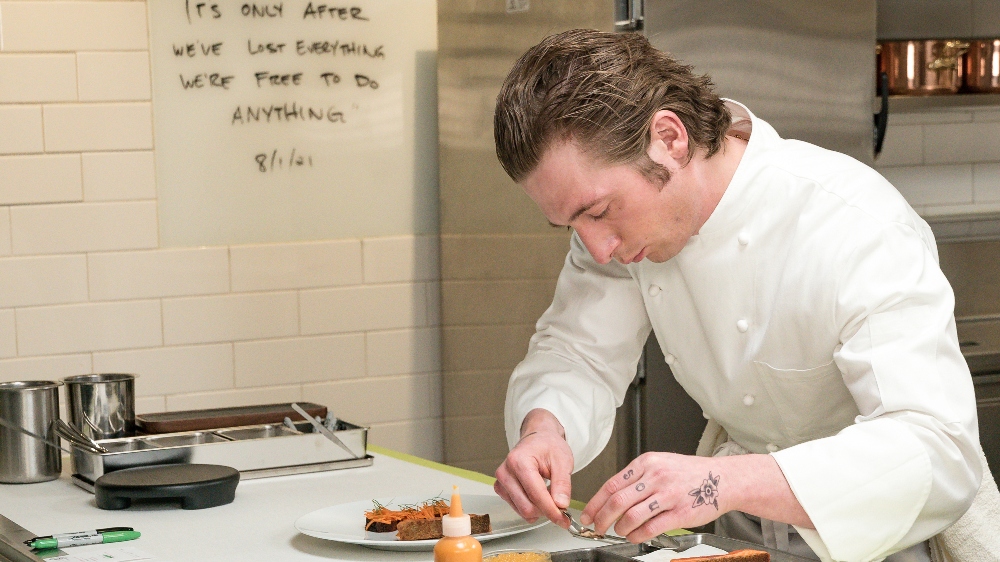
BTL: In addition to your story paralleling the character, did you also give Jeremy non-culinary advice as well?
Beran: There’s a lot more than just being able to hold a knife and cook something. Even the way the dynamic of the culinary scene has changed. I think anyone who started cooking the time around I did, and moving forward, what you find is the shift in dynamics of how people are treated in restaurants. How they interact and how restaurants are really battling the sort of struggle of, how do you make it a more professional industry? How do you treat people more professionally?
There were times when I was in kitchens where I was the one being yelled at and chased around, and the chef [is] screaming at you with a vein bursting in their head. Or I was that person chasing people out the back door. There’s still that struggle if something goes wrong at the restaurant now it’s not screaming at the top of your lungs. It’s, ‘take a breath and stop and understand why it’s going wrong and how you can correct those things.’ There’s still that inner struggle of reverting back to that old thing of just screaming at someone and belittling them vs. trying to present a more mature and composed front, a more professional environment. Being able to convey that internal struggle a bit to Jeremy for his character is something you can’t just make up. He has to understand that and he did a great job with it.
BTL: Was there any yelling at Jeremy?
Beran: [laughs] We’re not really a yelling kitchen. We’re also not going to put him in a position that will allow him to fail where we have to correct something. You can fail at not cutting vegetables, but if they go into a stock that’s the point. It’s just building repetition. He did great.
BTL: Similar to Jeremy, you learned on-the-job as well, so you also had that in common.
Beran: I studied business psych and philosophy in college and I graduated and decided I wanted to cook. My first real cooking job after college was at M.K. I just put my head down and worked and just tried to be better than the guy next to me. There’s a lot more finesse to it. So the challenge was to deliver that finesse without putting in the hours to get that. It was a lot of how to hold the spoon and the knife, [and] hold your fingers back, but I don’t think he came to us to learn how to cook. A lot of those skills you just pick up from watching people.
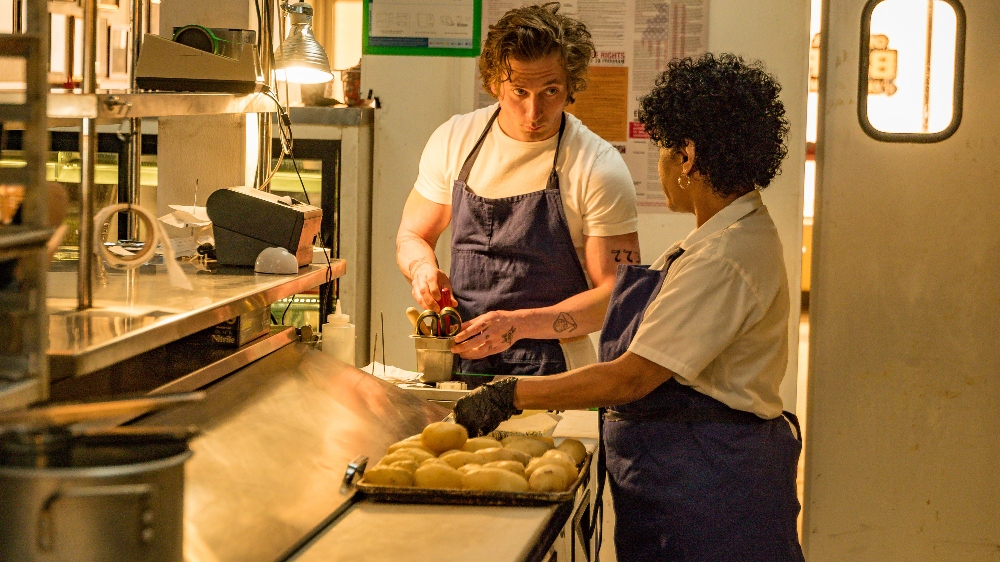
BTL: What were some of the skills that you wanted Jeremy to master?
Beran: I wasn’t trying to get him to master any skills as much as not look like someone who’d never been in a kitchen. When he started spending time with us in the kitchen we were only open five days a week, after slowly reopening from the pandemic. I think his first couple of times in the kitchen were with myself and my sous chef prepping on a Tuesday when we were closed. We just set up a cutting board with him. It was like, ‘here’s a bunch of vegetables to cut, and if you screw up it doesn’t matter,’ because they’re gonna go in a stock. I think getting to the point where we could have a conversation with him while he was cutting means he was getting to the point where those things are becoming second nature.
It’s really about repetition. For instance, picking up the salt at a certain height so it spreads more easily. How you hold your spoon. Especially in a fine-dining restaurant where you’re doing a lot of sauce work, you hold it like a pencil. How you fold your towels to hang up your apron if you have them there. I can always tell someone who walks into the kitchen who doesn’t have a lot of experience just by how they tie their apron. How do you have five people on a line and not crash into each other all the time? You learn how to work together. It’s doing it over and over again until you got proficient in it.
BTL: He does some serious chopping in the show. How did he improve with you?
Beran: It helped that he had a crash course at a culinary school. Clearly, by the way that he improved each time he came, he was dedicated to what he was doing. His questions would change every time. By the last day in the kitchen with us we had him working the line with us and he was cooking fish. Granted it wasn’t like, ‘go nuts and do whatever you want.’ It was still that idea that we are going to treat you like someone trying to get a job here so show us like you want to work here. It was little things like if I tell you to baste a piece of fish, you’re gonna grab onto the spoon and flick butter at it and it’s gonna be a disaster. But if you baste a fish for the last 10 years of your life, I don’t even have to look at the fish or the butter knife and baste it. The biggest thing we tried to offer him was comfort in being in the situation.
BTL: So it was more about seeing the philosophy of the kitchen and how it works.
Beran: Just how we work, how we talk to each other, the general demeanor behind the restaurant. I think the more perspective you get on that, the more you can create your own character as a chef. We would just start chatting. He would be here for six to eight hours a day and have family meal with us. It wasn’t just him and I attached at the hip. He probably spent a quarter of his time with me. He would eat staff meal with all the cooks. We tried to treat him like an intern in our kitchen. If he’s gonna learn how to do it, he’s gotta go be one of the cooks.
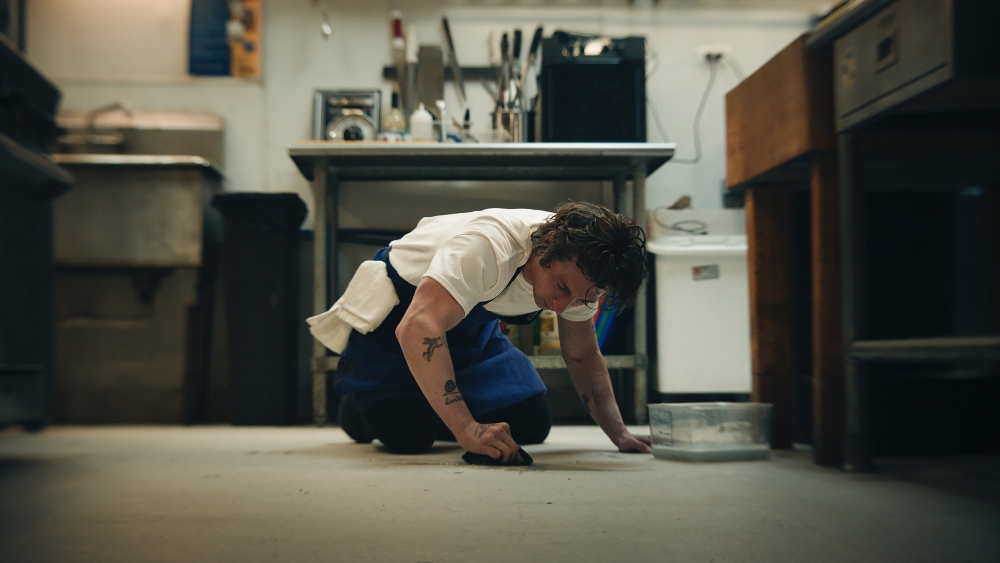
BTL: How do you feel when you watch the show? Is it authentic to your experience?
Beran: It’s funny when I watch it, I know the fine-dining kitchen that he’s standing in. That’s in Grace, Curtis Duffy’s restaurant that closed. Curtis and I worked together in Alinea so I know that restaurant very well. I know that feeling, I know that place, I’ve been there. It was exciting to see him [Chris Storer] showcase that struggle and challenge to it, but also see them trying to evolve. Calling each other chef is more of a cultural thing among restaurants, more in fine dining. Blending in that fine-dining element like the Comey blue apron which was made famous by French Laundry. Also, there’s always the cook who’s trying to create stuff that loses track of their own prep like the pastry chef in the show. We’ve all had cooks like that in our kitchen who are so excited to make the new thing that they can’t do the task at hand. Or the over-ambitious sous chef who is trying to change everything. I’ve been that person. They did a good job at filling those characters which exist.
BTL: When all was said and done, how did Jeremy fare?
Beran: This was a first and Jeremy was super professional about it. We treated him like a cook. I obviously wouldn’t let him serve anything that didn’t work. I’m not gonna let him throw something away so I won’t let him fail, but it also helped that we had a couple of friends eating in the dining room so they were the guests that got his food. We put him on the line with my sous chef and I and he cooked fish with us. He plated the food and he seared the fish. We spent one day with him learning how to make sauces. You gotta burn your arm a little bit and learn how to do it. You got to baste the butter and learn what proper foaming butter is. He did what a normal cook would do here and that was the goal. To his credit he wasn’t trying to act like a chef, he was trying to Be a chef. From my perspective, he really immersed himself in the role so it was a pleasure having him in the kitchen and working with him.
Season 1 of The Bear is now streaming in its entirety via FX on Hulu.





